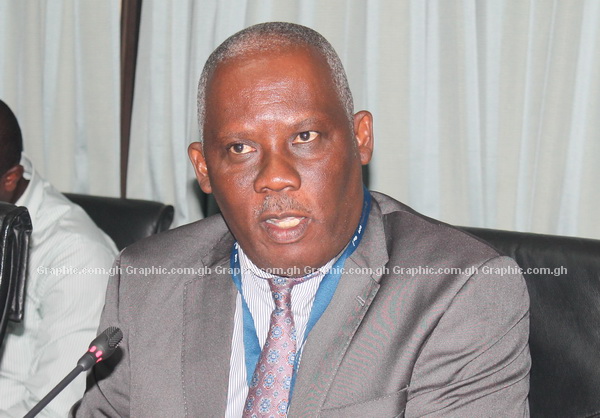
Former banking supervision head faces EOCO over UT, Capital banks collapse
The immediate past Head of the Banking Supervision Department of the Bank of Ghana (BoG), Mr Raymond Amanfo, has been summoned by the Economic and Organised Crime Office (EOCO) to answer charges on his role in the collapse of the UT and the Capital banks.
The summoning follows a damning finding in an investigative report submitted to the BoG which indicts Mr Amanfo of culpability in the collapse of the two banks.
Advertisement
Information gathered by the Daily Graphic suggests that the retired head of the Banking Supervision Department is alleged to have charged and collected various sums of money from the banks to alter feasibility reports to favour them.
Daily Graphic sources also alleged that distressed banks that refused to pay money to the supervision department did not find favour with Mr Amanfo.
Mr Amanfo, who is scheduled to appear before the investigative body at 9:30 a.m. today, Thursday, May 31, is expected to be grilled on the disbursement of the liquidity support the central bank offered to the two collapsed banks.
When contacted, Mr Amanfo told the Daily Graphic that he was yet to receive an invitation from the investigative body.
“Nobody has contacted me and my number is available at the BoG. So when I am invited, I will answer the call,” he said.
He, however, declined to comment on the allegations picked up by the Daily Graphic.
Corporate governance breaches
The Governor of the BoG, Dr Ernest Addison, had, at a Monetary Policy Committee news conference in Accra on May 21, blamed some shareholders and directors of the banks who failed to observe good corporate governance that led to the collapse of the banks.
“Once the process is allowed to run its course, you would have all of these people, in a sense, come to account to all of us on why these things happened.
“EOCO has already invited some of the shareholders and directors to come and explain some of the activities that took place,” he said.
“Don’t be surprised if even internal people who were involved – I’m talking about BoG staff – could also be invited. The accountability process is going on; it’s not yet ended. So let’s see how that whole process unfolds.
“There are other processes that will continue and at the end of that process the true cost of the exercise will become clear and all the parties involved will be subjects of interrogation,” Dr Addison added.
Severe impairments
The BoG, in August last year, revoked the licences of UT Bank and Capital Bank due to severe impairment of their capital.
The central bank has approved a purchase and assumption transaction with GCB Bank Ltd that transfers all deposits and selected assets of the two banks to GCB Bank Ltd.
The liabilities of the two banks, according to the BoG, overwhelmed their assets, leaving the BoG with no option but to undertake a purchase and assumption transaction as the least costly method of dealing with a collapse.
The banks were “unable to develop an acceptable plan”, according to the BoG, although it made efforts to help both banks recover through private alternatives.
However, the owners and managers of the UT and the Capital banks were unable to increase the capital of the banks to address the insolvency.
Key investigative findings
The investigative report revealed, among other key findings, that the two liquidated banks were run by owner chief executives, with complete disregard for internal rules and banking regulations.
The directors of the two banks would be made to answer questions on how they singularly made decisions on credit extension and breached all the rules regarding related party transactions and connected lending.
Dr Addison, at the inauguration of the new Ecobank Ghana Head Office in Accra earlier this month, said the two banks suffered from weak corporate governance standards.
The central bank assured the public that it had sharpened its focus on a strong supervisory regime that effectively identified threats to safety, soundness and stability in the financial sector.
“In this regard, the BoG is transiting from the current capital measurement framework to a risk-based capital requirement based on the key Basel II and III pillars,” the governor said.
Restructuring banking sector
The takeover of two banks at the same time was the first and biggest in the history of the banking industry in Ghana.
The development was part of moves by the government, through the BoG, to restructure the banking sector.
The move was to rescue the two from further challenges, as both balance sheets were in the red.
It was expected that the assets and liabilities of the two banks would be realised and settled respectively through a receivership process to be undertaken by Messrs Vish Ashiagbor and Eric Nana Nipah of PricewaterhouseCoopers (PwC).
The purchase and assumption agreement allows GCB Bank to take over all deposit liabilities and selected assets of both the UT and the Capital banks, per Section 123 of the Banks and Specialised Deposit-Taking Institutions (SDIs) Act, 2016 (Act 930).
Celebrated brands
The news of the collapse of the two banks had shocked many, since the two had won numerous awards for performing successfully in the industry.
Just a year before the takeover, Capital Bank swept three awards at the Ghana Banking Awards. The bank was once named as one of Ghana’s Most Respected Companies.
It was also adjudged the Best Growing Bank, the Best Bank in Deposits and Savings and the Best Bank in Household/Retail Banking at the 15th Edition of the event, while UT Bank was adjudged the Best Bank in 2011 by the same institution.



